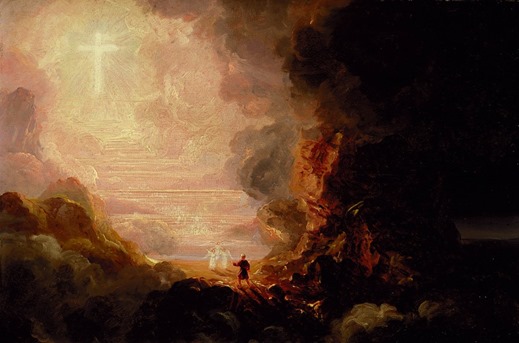John Bunyan was a Baptist pastor imprisoned for a dozen years for preaching without a license from the Church of England. While in prison, he penned the famous allegory The Pilgrim’s Progress. In this passage from that work, two believers on their way to heaven are prisoners of Giant Despair, the lord of Doubting-Castle. Thinking they had found an easy shortcut, Christian and Hopeful had left the more difficult trail that ran along the River of the Water of Life. With the encouragement of a character named Vain-confidence, they ventured out across By-Path Meadow, only to find themselves in captivity, subject to terrible beatings and verbal abuse. Prompted by his wife, Giant Despair urges his two victims to kill themselves to escape their misery. Christian finds it tempting, but Hopeful talks him out of it, arguing that it would be an instance of damnable murder and an act of faithlessness in light of God’s sovereign care. Finally, after a long night of prayer, Christian comes to his senses as he realizes the promise of God’s watchcare for those who follow him. Using this promise as a key, the two escape and resume their journey. Of course, believers do not have to agree with Bunyan that suicide kills the soul, but they can appreciate both his sensitivity to the despair that true Christians can face and his determination to denounce suicide as an option. Perhaps this episode tracks with Bunyan’s own spiritual struggles while he was himself a prisoner.
[W]hen he [Giant Despair] arose, he getteth him a grievous crab-tree cudgel, and goes down into the dungeon to them, and there first falls to rating [berating] of them as if they were dogs . . . Then he falls upon them, and beats them fearfully . . . This done, he withdraws and leaves them, there to condole their misery, and to mourn under their distress. So all that day they spent the time in nothing but sighs and bitter lamentations . . . [W]hen [the next] morning was come, he goes to them in a surly manner as before, and perceiving them to be very sore with the stripes that he had given them the day before, he told them, that since they were never like to come out of that place, their only way would be forthwith to make an end of themselves, either with knife, halter, or poison, for why, said he, should you choose life, seeing it is attended with so much bitterness? . . . Then did the prisoners consult between themselves, whether ‘twas best to take his counsel or no; and thus they began to discourse:
Christian. Brother, said Christian, what shall we do? The life that we now live is miserable. For my part I know not whether is best, to live thus, or to die out of hand . . .
Hopeful. Indeed, our present condition is dreadful, and death would be far more welcome to me than thus for ever to abide; but yet, let us consider, the Lord of the country to which we are going hath said, Thou shalt do no murder, no, not to another man’s person; much more, then, are we forbidden to take his counsel to kill ourselves. Besides, he that kills another, can but commit murder upon his body; but for one to kill himself is to kill body and soul at once. And, moreover, my brother, thou talkest of ease in the grave; but hast thou forgotten the hell, whither for certain the murderers go? For “no murderer hath eternal life,” &c. And let us consider, again, that all the law is not in the hand of Giant Despair. Others, so far as I can understand, have been taken by him, as well as we; and yet have escaped out his hand. Who knows, but that God that made the world may cause that Giant Despair may die? or that, at some time or other, he may forget to lock us in? or that he may, in short time, have another of his fits before us, and may lose the use of his limbs? and if ever that should come to pass again, for my part, I am resolved to pluck up the heart of a man, and to try my utmost to get from under his hand . . . [M]y brother, let us be patient, and endure a while. The time may come that may give us a happy release; but let us not be our own murderers. With these words, Hopeful at present did moderate the mind of his brother . . .1
![]()
![]()
Footnotes:
![]()
1 John Bunyan, The Pilgrim’s Progress (London: Routledge, Warne, and Routledge, 1861; repr., Grand Rapids: Baker, 1967), 146-149.





